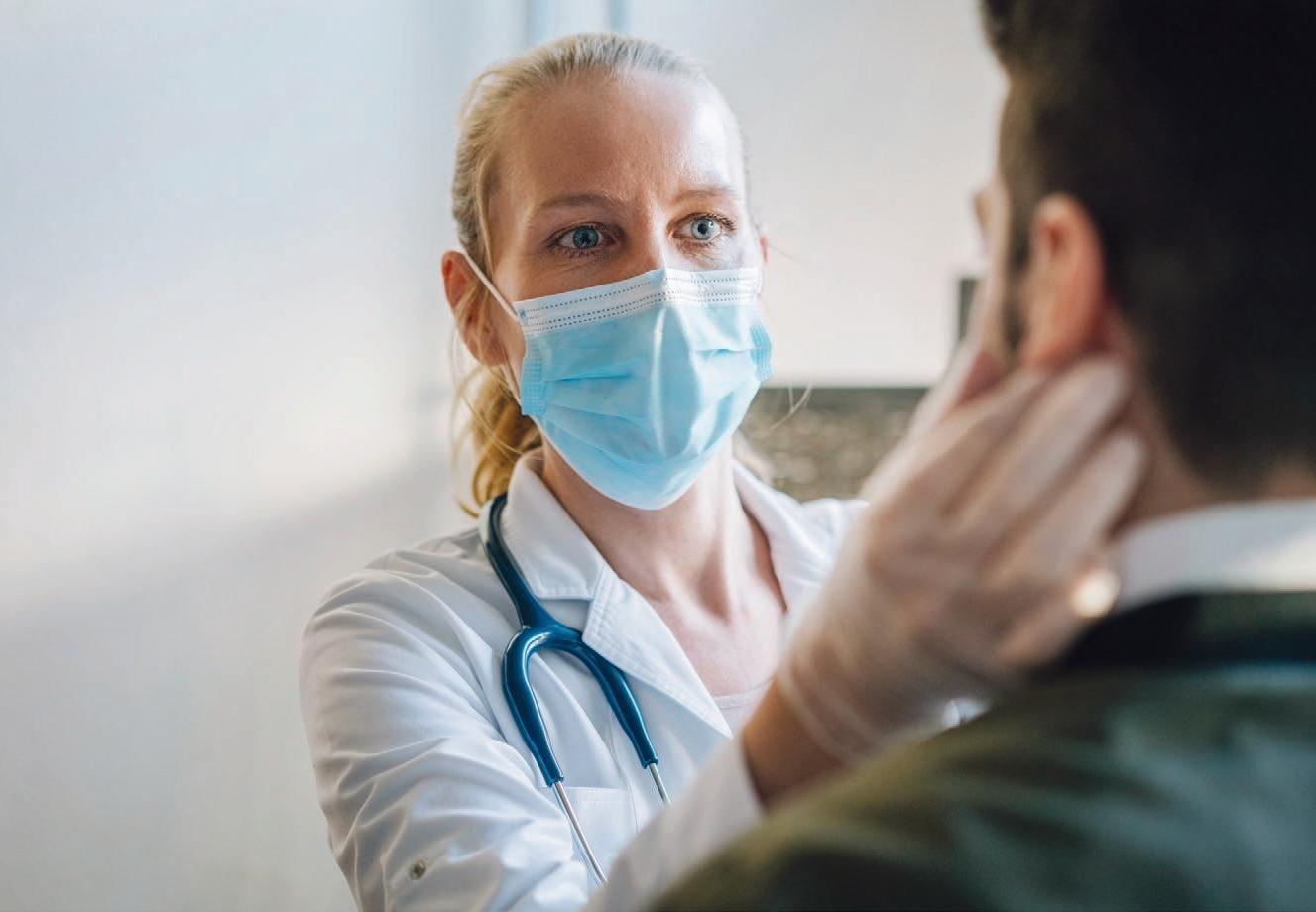
5 minute read
Prioritize Your Health
PRIORITIZE YOUR HEALTH How to Handle Your Health Care Needs During a Pandemic
The COVID-19 pandemic has changed our communities and reshaped how we get health care. While social distancing remains Dr. Shawn Tittle important as we move forward, taking care of ongoing health needs should also be a top priority. When you need care, it’s important to take action right away.
Postponing health care visits or treatments may actually hurt your health in the long run. If you delay going to the doctor for small problems like a rash, an infected toenail or urinary tract infection, these issues can become bigger problems and may require urgent attention.
Now is the time to be proactive about identifying health risks and following through on treatment plans. “Preventive care, health screenings, vaccinations, medications and treatments are essential health management steps to take,” said Dr. Shawn Tittle, a thoracic surgeon and the chief medical officer at Houston Methodist Baytown Hospital. “Postponing screening tests or neglecting health issues could result in bigger problems down the road.”
If you have a chronic condition, you should work with your doctor to improve your health. Managing your existing health conditions may help you be healthier and stronger if you need to fight off an illness or infection in the future.
PUTTING SAFETY FIRST As we navigate how to interact within the community, we’re learning that COVID-19 may be with us for a long time. While we wait for answers on vaccines and immunity, we’re finding ways to adjust to a new normal and return to our daily activities in a safe manner. This involves wearing masks in public, keeping 6 feet apart from others and staying vigilant about handwashing and wiping down surfaces. Keeping these social distancing practices in place is essential to our efforts to slow the spread of the virus.
“Your health and well-being are our top priority — now more than ever as we work to meet the challenges of the pandemic,”
Tittle said. “We are dedicated to providing you with exceptional care, and you can be confident that we are taking every necessary precaution to keep you safe during your visit.”
All Houston Methodist campuses are focused on making your visit as safe as possible, and we are taking extra precautions, such as:
Requiring all patients, visitors and employees to wear a mask.
Elevating our cleaning and housekeeping practices.
Health screenings for patients, visitors and staff.
Isolation measures for COVID-19 patients.
Adhering to a strict essential visitor policy.
Implementing social distancing in our waiting rooms and elevators. Minimizing waiting in public spaces.
Offering remote check-in.
WAYS TO GET CARE At Houston Methodist Baytown, we’re expanding virtual services and staggering in-person appointments with your safety in mind. Connect with us in the following ways to schedule your next appointment: Doctor appointments – Schedule a virtual video visit or in-person appointment with your primary care doctor or specialist. Simply call your doctor’s office or use the “Schedule an Appointment” button in MyChart. If you need to find a doctor, visit houstonmethodist.org/find-a-doctor or call 281.428.2273. Virtual Urgent Care– Nonemergency urgent care is available 24/7 via video visit. Download the MyMethodist app or visit houstonmethodist.org/ virtual-care to learn more. Same-Day Clinics – To schedule an appointment at the Baytown Primary Care Clinic, call 832.556.6670. To schedule an appointment at the Mont Belvieu Primary Care Clinic, call 832.556.6936. Orthopedic Injury Clinics– Schedule a same-day appointment at your nearest orthopedic injury clinic. Visit houstonmethodist.org/osm-injurybaytown for clinic locations. Emergency Care – Open 24/7 to provide a full spectrum of medical services if you need emergency care. Visit houstonmethodist.org/er to find your nearest Houston Methodist Emergency Care Center or ER. E-visits– Same-day visits for nonemergency urgent care through online messaging. Sign up for MyChart to get started, and then log in to complete an e-visit through MyChart. Visit mychart.houstonmethodist.org to log in or register.
HOUSTON METHODIST INNOVATIONS
FIGHTING COVID-19 When facing a pandemic strain of a novel virus, every second is critical. Since the outbreak started, Houston Methodist’s physicianscientists have been working around the clock on investigating potential therapies for COVID-19.
VACCINE RESEARCH AND DEVELOPMENT Houston Methodist researchers are partnering with GeneOne Life Science Inc. to develop an RNA vaccine against COVID-19. Houston Methodist developed an RNA therapeutics research program to design, manufacture and test clinical-grade RNA.
REMDESIVIR CLINICAL TRIAL Houston Methodist was the fifth clinical trial site in the U.S. to offer the antiviral drug Remdesivir as an investigational therapy for COVID-19 patients. Investigators say the goal is to hold off the deadly inflammatory cascade that leads to respiratory failure and the need to be intubated and put on a ventilator. Early results of the trial are promising, with patients responding to the antiviral drug.
PLASMA INFUSION THERAPY Houston Methodist was the first academic medical center in the nation to transfuse donated plasma from a recovered COVID-19 patient into a critically ill patient. Like a blood donation, physicians use plasma from patients who have recovered from COVID-19, in the hope that their blood plasma contains antibodies to fight the virus. The donor's plasma is then infused into ill COVID-19 patients, who are not yet immune to the virus. One of the major advantages of this treatment approach is that it can be used right now, while vaccines and antiviral drugs can take from months to years to develop.

DEVELOPMENT OF INNOVATIVE TOOLS Houston Methodist and its partners have worked on prototyping and developing a variety of clinical devices to address immediate needs brought about by COVID-19. Houston Methodist created a plexiglass box in-house to reduce the risk of exposure to COVID-19 for doctors and hospital staff. The container uses plexiglass barriers and a vacuum device to filter the air before releasing it back into the room. Houston Methodist’s new Engineering Medicine Program (EnMed), a collaboration with Texas A&M University College of Medicine, acquired and tested a helmet made from a lightweight, transparent plastic aerosol box, which is used to keep patients off ventilators and stabilize them in the ICU. In addition, EnMed faculty used 3D printing technology to produce 3D printable spacers, which are in high demand for treating COVID-19 patients. The spacers are needed to safely administer bronchodilator drugs through inhalers instead of using nebulizers, which release a mist into the air.






